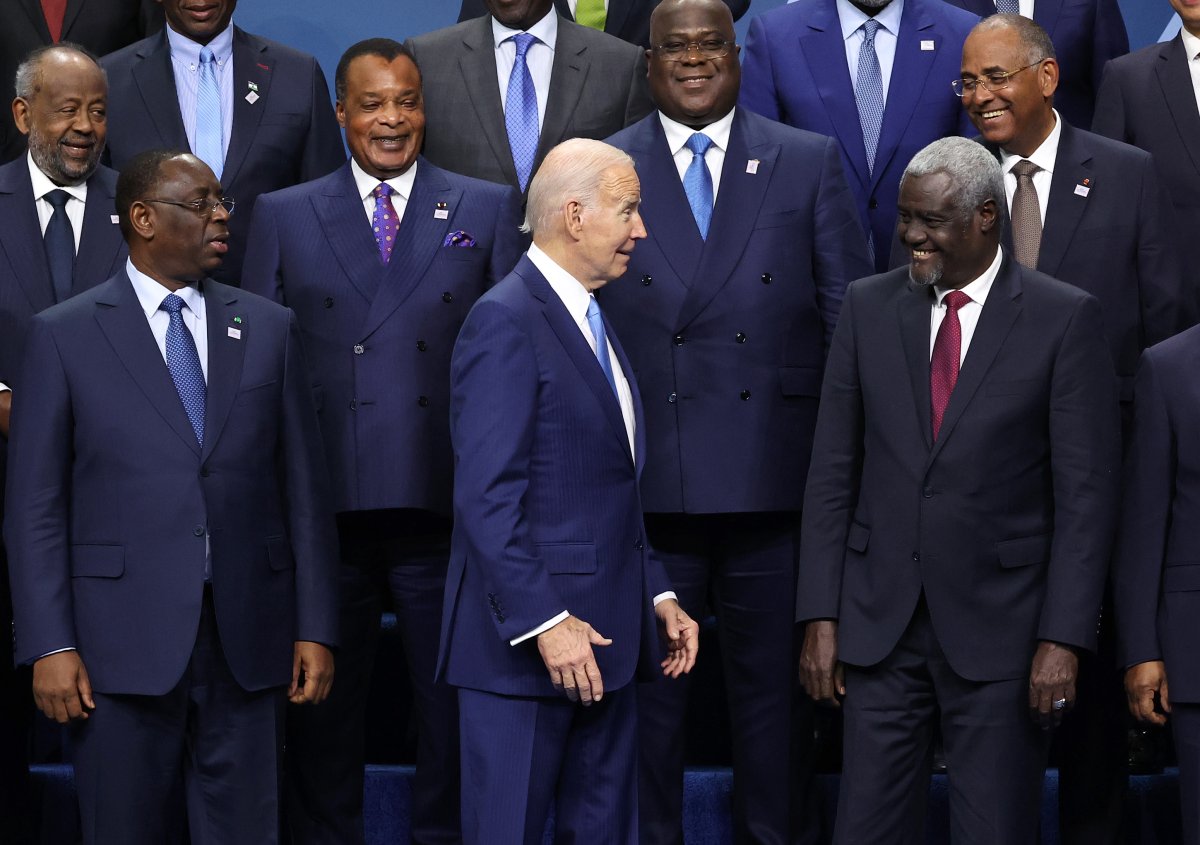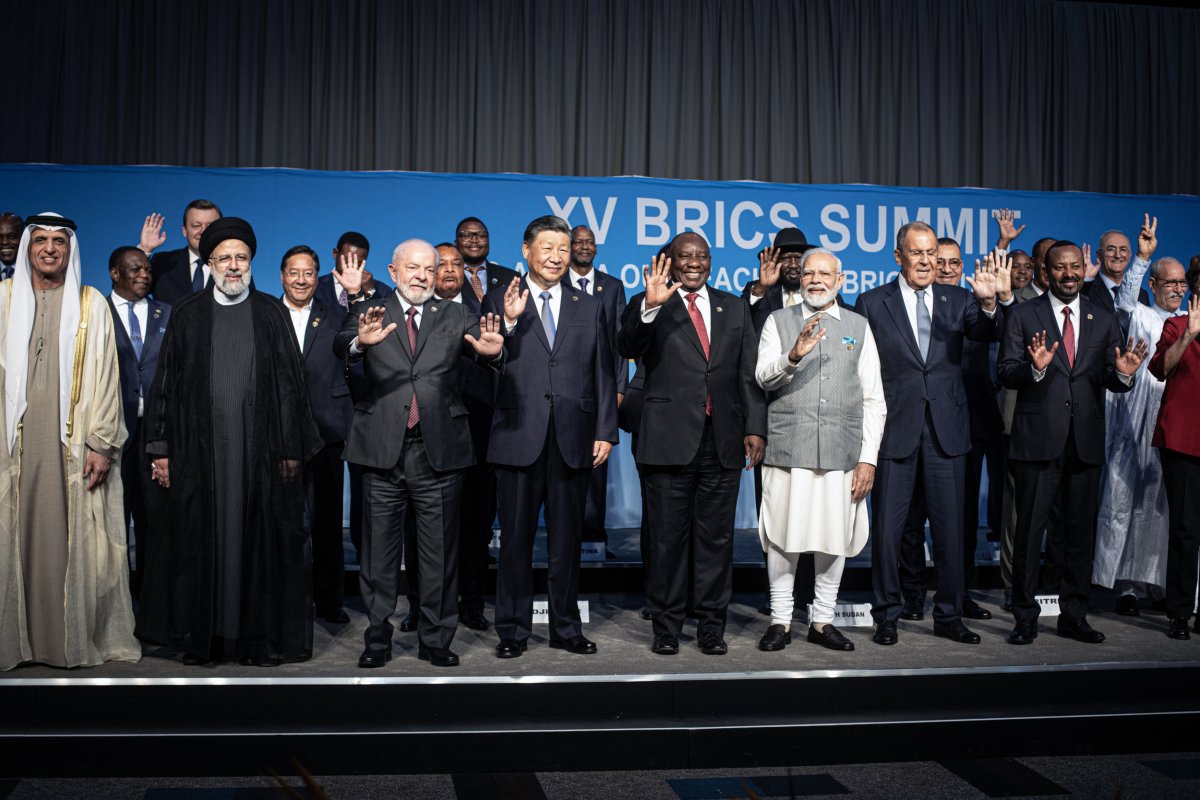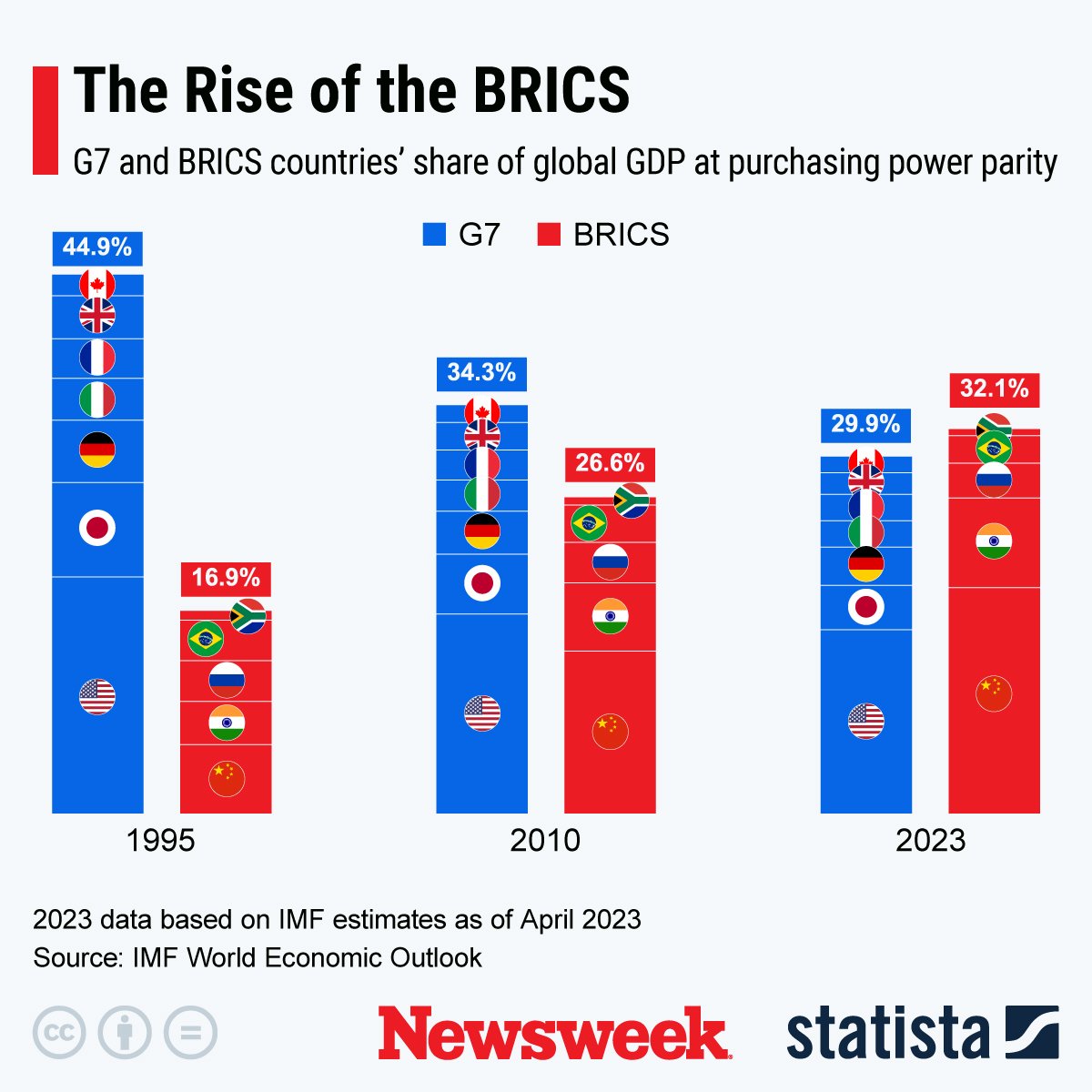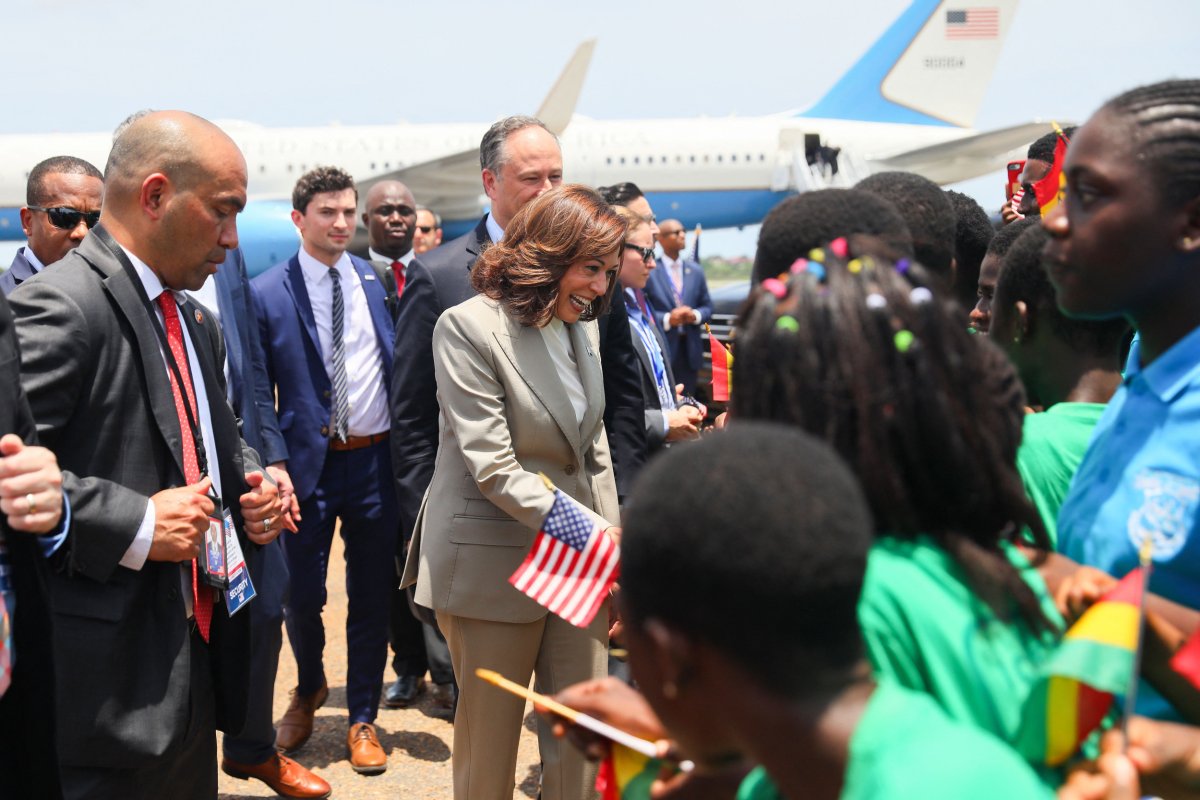At a time when African nations have become increasingly involved in global affairs, a continent that has long fallen into the periphery of Western policies is looking to capitalize on its vast economic and geopolitical potential to establish itself as a major player on the world stage.
But as this trend manifests, the United States finds itself needing to reinvent an approach that threatens to leave Washington and European allies behind.
"I think that we're at an inflection point," Ivor Ichikowitz, a South African industrialist who founded the aerospace and technology company Paramount Group and today serves as chair of the Ichikowitz Family Foundation, which leads the African Youth Survey, told Newsweek. "We're at a point where the next generation of African leadership is the first generation in living memory that hasn't lived through the challenges of colonialism and the challenges of apartheid."
"It's a generation that sees their Africanness as a superpower and it's a generation that sees their role as global citizens as being an entrenched right, and this is the first time that that's happened," he added. "And that's why I'm talking out as much as I am about this, because if the West doesn't pay attention to this now, they will again have missed the boat."

Signs of this transformation have been apparent for some time, most recently at the BRICS summit hosted earlier this month by South Africa alongside fellow members of the informal economic coalition Brazil, Russia, India and China. In the bloc's first expansion in over a decade, six new candidates were invited to join, two of them—Egypt and Ethiopia—from Africa.
At least three more—Algeria, Nigeria and Senegal—have reportedly applied to join BRICS, as well as approximately 15 applicants from Asia, Europe and Latin America. Altogether, at least 28 delegates from Africa attended the 15th BRICS summit in Johannesburg.
Given its diversity, which is likely to grow as it takes on new members, BRICS itself does not form a unified geopolitical bloc, but it has managed to muster up a common goal of addressing deep-seated concerns among nations of the Global South regarding access to development assistance. This objective has brought with it growing criticism of Western-led institutions such as the International Monetary Fund (IMF) and the World Bank, and even the U.S. dollar's role as the basis for the majority of global trade.
"It's out of frustration, out of irritation that this new course is starting to happen," Ichikowitz said. "Because there's a perception, certainly in Africa, certainly I think in China, and definitely in Russia, that these organizations have failed the developing world, that they are organizations that are used by the developed world to exert policy pressure on the developing world, and there is a very, very strong negative sentiment towards that kind of behavior."
And though plans for forming a major alternative to such institutions are still in their nascent stages, the potential for such a shift continues to increase amid a perceived lack of response by the West.
"What's come out of the long and somewhat complex statement that's been made by the BRICS countries as a result of the summit is a very strong message to the rest of the world," Ichikowitz said, "which is a message that says, 'Pay attention, because we might not be powerful enough to do this now, we might not be sufficiently unified now to do this, but we could be in the future.'"
This could prove especially consequential for the U.S., as both China and Russia have accelerated efforts to foster partnerships across Africa.
Beijing has refined Afro-centric diplomacy for decades, with each Chinese foreign minister over the past 30 years choosing the continent as his first stop. Nearly every African country is also a signatory to Chinese President Xi Jinping's intercontinental Belt and Road Initiative, with China's investment in Africa unmatched by any other single power, including a vast network of projects focused on infrastructure development and the extraction of resources key for manufacturing 21st-century technologies.
Moscow has sought to channel its own historic Cold War-era influence in Africa, where the Soviet Union was a leading supporter of anti-colonial movements. Under President Vladimir Putin, Russia has struck up a number of partnerships focused on security and resources across the continent while seeking to expand into new areas of cooperation, as highlighted during high-level engagements such as the recent Russia-Africa Summit last month in Saint Petersburg.
U.S. President Joe Biden has also sought to bolster Washington's approach to Africa. This campaign was most clearly demonstrated by the U.S.-Africa Leaders Summit held last December and the U.S.-Africa Business Summit conducted in July.
Ichikowitz noted a distinct change in the tone adopted by U.S. officials in speaking with their African counterparts.
"It's the first time I've heard the United States talk to African countries as adults rather than as if they were children," he said, "a very, very telling inflection point in the thinking of Washington."
"Whether Washington really believes that or whether it's now just following the language of the Chinese that seems to have worked so well for China in its land grab in Africa, I don't know," he added, "but the reality is that there is a new way of looking at Africa, certainly in the United States."

And yet doubts persist as to how serious Washington is willing to get in engaging with Africa on new terms.
Mikatekiso Kubayi, a researcher at the Institute for Global Dialogue and a research fellow at the Institute for Pan African Thought and Conversation in South Africa, pointed out how, on the eve of the U.S.-Africa Leaders' Summit, the Biden administration announced new sanctions on Zimbabwe.
"The United States also passed legislation that focuses on its interests, such as the Countering Malign Russian Activities in Africa Act, without consideration of African agency over its territory and sovereignty to determine for itself what is malign and with whom to develop ties," Kubayi told Newsweek. "Even the language in some of these speaks purely to competition with China, and Africa as a peripheral thing devoid of agency to fight over."
On the other hand, Kubayi cited a new form of thinking that has emerged as a result of a stronger push by BRICS to reform and provide alternatives to an existing global financial architecture and governance system that he argued has "proven inadequate for the developmental aspirations of many developing economies."
"BRICS has been pushing for reform in these areas since its formation in 2009, and in fact, reform of the global financial architecture was its foundational agenda," Kubayi said. "The bloc has since expanded its agenda to include several more areas of cooperation, from the economy to culture, from science and technology to sport, as well as security."
"These are issues and possibilities that many developing economies have for decades not thought possible," he added, "and now they see a fundamental change in the dynamics of today's geopolitics."
Also fueling the emerging interest in BRICS is "the attractiveness of foreign policy sovereignty and genuine policy independence and agency," according to Kubayi. He argued that, "at its core, this is not about the dollar, but instead, it is about countries trading with each other with the freedom and flexibility of instruments that may not have to do with third parties or that may be cheaper or more beneficial in other ways."
Lina Benabdallah, an associate professor at Wake Forest University's Department of Politics and International Affairs in North Carolina, identified what she saw among African nations as a perceived "window of opportunity to apply pressure and seek concrete alternatives to the current financial and political institutions which do not value the agency of countries in the Global South."
"The recent expansion of BRICS—with many more countries in the waiting list—demonstrates the willingness to create a more inclusive platform that goes beyond elite and closed-off clubs such as the G7," Benabdallah told Newsweek. "With the financial disorientation of the post-pandemic and the historic record high inflation rates, there is a growing discontent with the current system, and BRICS offers a platform, at least in theory, from which to think about ways to mitigate some of these risks and damages."
But she too noted that "BRICS is far from realizing a full-on revisionist potential because of many challenges that exist within the group," not least of which include the varying economic potentials of its member states, both current and prospective, as well as the fact that most of them remain "deeply enmeshed with the global economy" as it currently stands.
"This is to say the concretization of BRICS potential might still be a little far out of reach, but the possibility is still there," Benabdallah said.
Even with a renewed interest in the U.S. of seeking to revamp diplomacy toward Africa, however, she emphasized that the "one thing that is super important about relationships is that they need time to build the trust, recurrence, and endurance needed for solid ties."
"Time is something that the partisan political system in the U.S. does not have," Benabdallah said. "By this I mean unless both sides of the political aisle understand the importance of prioritizing Africa in U.S. foreign policymaking, alternating between ignoring Africans and trying to build the trust will always cause a deficit for the U.S. side."

The above graphic was provided by Statista.
Reached for comment, an IMF spokesperson told Newsweek that the Washington, D.C.-based institution "has lending arrangements with 21 countries in Sub-Saharan Africa and has received many program requests," and that such lending "is done at very concessional rate, often 0%."
"We have also been changing as the world changes and are adapting to help our members and their people confront new challenges," the IMF spokesperson said. "Now – faced by a fresh set of transitions – we will continue to adapt and respond with agility: through both timely policy changes and stronger resources."
The IMF spokesperson also acknowledged the role of the BRICS New Development Bank and the Asian Infrastructure Investment Bank, both based in China, saying such "institutions have been created to address infrastructure and development needs that are not fully met by existing multilateral financial institutions."
"The IMF sees the emergence of these banks as an opportunity to enhance the global financial safety net and promote economic development and stability," the IMF spokesperson added. "These banks can mobilize additional resources, promote infrastructure investment, and support sustainable development in their respective regions."
At the same time, the IMF spokesperson urged such institutions to "adhere to high standards of governance, transparency, and environmental and social safeguards, aligning with international best practices." The IMF spokesperson also argued that "coordination among all development banks, old and new, is crucial to avoid duplication of efforts, manage debt sustainability, and to maximize the impact of collective financial capabilities for development."
Also contacted for comment, a U.S. State Department told Newsweek that "the United States reiterates its belief that countries may choose the partners and groupings with whom they will associate."
"We will continue to work with our partners and allies in bilateral, regional, and multilateral fora to strengthen our shared prosperity and uphold global peace and security," the State Department spokesperson said. "The majority of countries want a stable and open, prosperous, and secure world which respects sovereignty and territorial integrity, promotes shared prosperity, and enables cooperation on shared challenges."
"From robust economic development to access to clean energy; from maintaining food security to promoting public health—we are stronger when we work together on issues which matter to our people," the spokesperson added. "We have no interest in dividing the world into rigid blocs. The United States will continue to work closely with all our partners, including those which are members of BRICS."
The State Department spokesperson cited the U.S.-Africa Leaders Summit as an example of Washington's lasting commitment to the continent and said the administration continued to strengthen partnerships in a "whole-of-government effort" that included high-level visits from the likes of Vice President Kamala Harris, First Lady Jill Biden and a number of other officials, from members of the president's cabinet to business leaders and other high-profile figures.

And yet, Hippolyte Fofack, chief economist and direct of research and international cooperation at the Egypt-headquartered African Export-Import Bank, asserted that there was more work to be done if this relationship was truly to be revamped. He pointed to the notable absence of President Biden himself from any such visits to Africa, despite the U.S. leader's vow to do so during the U.S.-Africa Leaders Summit.
Beyond this, Fofack argued that Washington would need to fundamentally redefine economic relations with African nations that currently focus largely on "the geopolitical lenses and commodities structures."
"We should transcend that and see the continent as an investment opportunity, see the continent as a place where it can actually, through win-win investment relationships, reduce our vulnerability to less resilient supply chains," Fofack told Newsweek.
Doing so, he argued, would require a "candid assessment of the economic and trading landscape" that has emerged over the course of decades, one in which, for example, "sanctions are no longer as effective as they used to be only 20-30 years ago."
And while Fofack too said BRICS had a number of obstacles to overcome before it could prove a sizable challenge to a U.S. dollar-dominated international trade regime, he argued that the increasingly globalized effort put forth by the bloc to conduct trade in local currencies could ultimately address some of the immediate financial challenges faced by African countries, such as liquidity constraints hampering the economic potential of the continent.
Washington could also be part of the solution, however, and Fofack argued that "effective African engagement has become a necessity for U.S. global leadership."
He argued that projected growth for the continent may be such that the U.S. is "forced to adjust" its approach, especially as a growing number of African leaders "no longer want to be part of this global arrangement whereby they can only integrate into the global economy as supplier of raw materials." Increasingly, he said, they sought to establish their countries as hubs for manufacturing the kind of products and components composed of such materials, creating well-paying jobs that could, in turn, address the continent's unemployment crisis.
But Fofack said U.S. politicians and corporations alike would need to be pushed to realize the benefits of such an arrangement, as well as the opportunities lost as a result of the current approach, even with its lofty rhetoric.
"The moment you say that you see yourself as the partner of choice, you won't make the right investment," he said. "You have to realize that, in terms of scale, you're no longer number one when it comes to African trade, you're not even number two, so we have to work hard to retain that top spot and we will never achieve that by being complacent."
Uncommon Knowledge
Newsweek is committed to challenging conventional wisdom and finding connections in the search for common ground.
Newsweek is committed to challenging conventional wisdom and finding connections in the search for common ground.
About the writer
Based in his hometown of Staten Island, New York City, Tom O'Connor is an award-winning Senior Writer of Foreign Policy ... Read more
To read how Newsweek uses AI as a newsroom tool, Click here.






